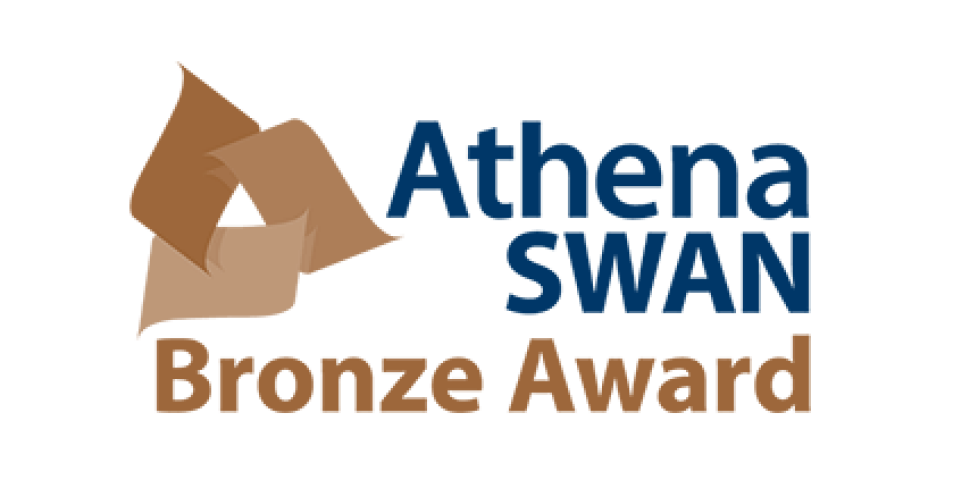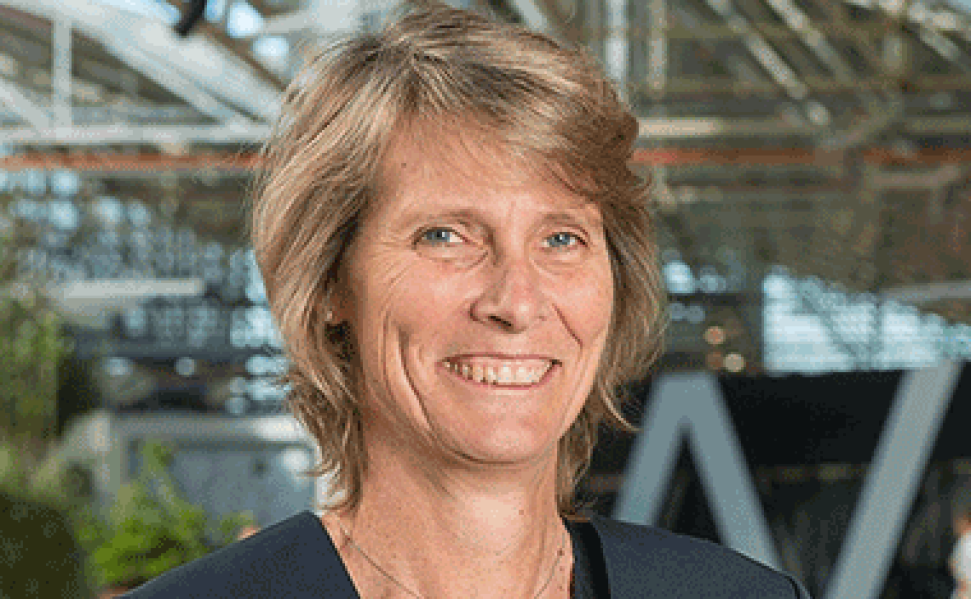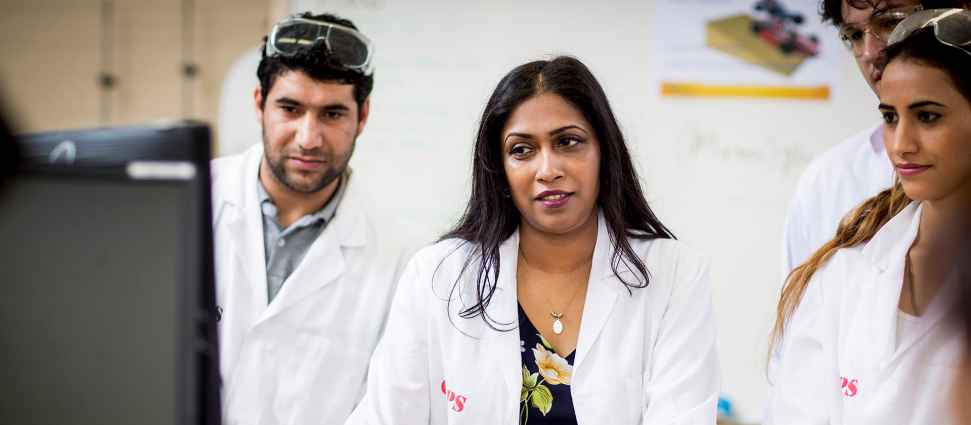Athena SWAN at Flinders
Flinders is pleased to be recognised for our ongoing efforts towards achieving gender equity, diversity and inclusion by being awarded Athena Swan Bronze Accreditation and three of five Cygnet awards required to apply for Silver Accreditation.
Delivered through the national body SAGE (Science in Australia Gender Equity), this internationally recognised framework incorporates the principles of intersectionality and provides a structured approach for institutions to identify and address gender inequities.
While attaining the Athena SWAN accreditation and three Cygnet awards are important milestones, this marks only steps in our journey as we continue to champion diversity and seek to deliver equality of opportunity for all. We are committed to the ten-point Athena SWAN charter and to implementing Flinders Athena Swan Bronze Action Plan.

Background
Developed in the UK in 2005, Athena SWAN has been hugely successful with more than 90% of universities in that country achieving institutional membership. Its evidence-based approach to analysis, action and demonstrable impact has transformed how institutions encourage, recognise, and advance the careers of women in academia.
The program’s initial charter now also includes non-STEMM disciplines, professional staff and intersectionality- which is the layering of social categories such as race, class and gender to create overlapping discrimination or disadvantage.
Cygnet Awards
To progress to Silver Accreditation organisations are required to achieve 5 SAGE Athena Swan Cygnet awards. Each Cygnet award builds on Bronze Accreditation and are awarded to organisations that demonstrate they have achieved sufficient progress in removing or reducing barries to equality in nominated key priority areas.

Matthew Flinders Distinguished Professor Karen Reynolds, (Biomedical Engineering)
Cygnet 1
Flinders University is recognised as a national leader in supporting Indigenous talent.
Flinders University proudly received our inaugural Cygnet award in recognition of our unwavering commitment to reduce barriers to attraction and retention, and foster opportunities, for Aboriginal and Torres Strait Islander staff members.
The award highlights the university’s efforts to build a culture of respect and inclusion with the aim of attracting and retaining Indigenous staff, while taking concrete steps to increase development opportunities and improve governance mechanisms.
Further information about SAGE, the internationally recognised Athena Swan Program and Flinders Athena Swan Bronze and Cygnet Applications, can be accessed via the SAGE website.
Red Flinders University SAGE Cygnet 1 Award Application here.
Cygnet 2
Flinders University is recognised for leading the way on Indigenous student participation.
Flinders second Cygnet has been awarded in recognition of Flinders’ commitment in supporting Aboriginal and Torres Strait Islander students to achieve their educational goals.
Flinders application highlights the work undertaken to support Aboriginal and Torres Strait Islander graduate outcomes including the provision of culturally appropriate academic support, increased access to financial assistance, accommodation scholarships and outreach activities in rural and remote areas.
For more information about Flinders Office of Indigenous strategy & Engagement click here.
To find out more about Flinders Indigenous Employment opportunities, Workforce Strategy and Student Employment Scheme please visit our Indigenous Employment page.
Read Flinders University SAGE Cygnet Award Application 2 here.
Cygnet 3
Flinders University is proud to announce that it has received its third SAGE Cygnet Award in recognition of our ongoing commitment to supporting parents and carers in the workplace.
Flinders University is proud to announce that it has received its third SAGE Cygnet Award in recognition of our ongoing commitment to supporting parents and carers in the workplace.
This prestigious award highlights the significant work undertaken to improve resources and policies that assist our staff in balancing family and career commitments.
To learn more about the extensive range of parental and caregiving supports available, including Flinders Parental and Caring Support Guide, please visit our Family and Caring webpage.
Read Flinders University SAGE Cygnet Award Application 3 here.
The above artwork is the creation of contemporary Aboriginal artist Elizabeth Close, a Pitjantjatjara Yankunytjatjara woman and Flinders alumna, who graduated from the University with a Bachelor of Nursing in 2011. View artwork credits
Flinders' participation
In September 2016 Flinders embarked upon its Athena SWAN project as part of the second cohort of Australian institutions undertaking the rigorous assessment process.
We analysed our performance across areas such as workforce gender diversity, promotions, leadership opportunities and training, parenting support and leave, Indigenous employment, disability support, LGBTQIA+, cultural and linguistic diversity, and student diversity by forensically examining data from across the University to demonstrate our actions and identify where further work was needed.
Flinders established Diversity and Inclusion Committee, provides a governance link between Colleges, Portfolios and committees, the Senior Executive Team, and Vice-Chancellor to guide and report on the implementation of our action plan.
In 2023 a Senior Diversity and Inclusion Consultant was employed to lead Flinders action planning and implementation towards Athena Swan Silver accreditation status.
Flinders 5 key priority areas for Athena Swan Bronze actions:
- Aboriginal and/or Torres Strait Islander staff
- Aboriginal and/or Torres Strait Islander students
- Support and cover for parental leave: before during and after leave
- College of Science and Engineering (STEMM pipeline)
- Support given to academic staff for career progression.
Flinders was awarded our inaugural Cygnet in February 2024, and the second in July 2024.
- Conduct an assessment of gender equity at Flinders that includes:
- Staff data (quantitative)
- Policy and practice analysis of systems and arrangements (qualitative)
- Identify challenges and opportunities for enabling the Athena SWAN charter to be put into action at Flinders.
- Create a 4-year plan using the information gathered in the assessment phase (above)
- Implement an organisational structure (including a Self-Assessment Team) to carry the actions required forward.
- Leadership and commitment
- Honesty and self-reflection
- Communication and engagement
- Data analysis and discussion
- SMART (specific, measurable, achievable, relevant, time-bound) actions.
Flinders University Athena SWAN Application 2018
Executive Summary
This document summarises the Flinders University application for Athena SWAN Institutional Bronze accreditation, submitted in April 2018 and being awarded Bronze accreditation in August 2018.
The application outlines the rigorous assessment undertaken, reviewing our policies, behaviours and data to gain an understanding of our strengths, weaknesses, areas for improvement and priorities for future action. It covers the self-assessment undertaken, with data interrogated by an internal Self-Assessment Team, which then set priorities for deeper analysis, additional surveys and focus groups to assist better understanding of reasons for inequities. These provided another level of data, both quantitative and qualitative, that informed the development of the actions within the 4-year action plan.
The section, Description of the institution outlines the background of Flinders, with a timeline of equity-related achievements from its inception in 1966 through to 2018, and explanation around the consultation and development of the strategic plan. Extensive restructuring was a feature of the 2015-2017 period of the self-assessment for the application, which has impacted on data availability and comparisons across years. The 2017 snapshot of staff numbers showed 2,017 Academic and 1,956 Professional staff women alongside 1,174 Academic men and 805 Professional staff men (head count including casual staff). Assessment found that proportions of women in teaching-only positions were higher in every College, and the 2018 Your Voice survey feedback was that some staff perceived a culture valuing research over teaching and that teaching needed better recognition (actions 2.A and 2.B). Lower numbers of women staff and students were a feature of the College of Science and Engineering (actions 2.C, 2.D and 2.E).
The Self-Assessment Process outlines changes to governance of the University’s Athena SWAN project, including the contribution of 31 staff to the self-assessment team across 2015-2017, the creation of a new governing group in late 2017, and the need for a different governance structure regarding implementation of the action plan (actions 3.A, 3.B and 3.C).
A picture of the institution outlines level-by-level data for gender across 2015-2017 University-wide and for each STEMM College (defined as Colleges of Science and Engineering; Medicine and Public Health; and Nursing and Health Sciences) and for non-STEMM Colleges (combined data for Colleges of Business, Government and Law; Humanities, Arts and Social Sciences; and Education, Psychology and Social Work). Issues highlighted were the low proportions of women in most colleges, particularly at Level E, and for the College of Science and Engineering low proportions also at Levels C and D (actions 4.1i.A, 4.1i.B, 4.1i.C, 4.1i.D, and 4.1i.E). The impact on gender proportions with the bedding down of restructuring from 2018 onwards was indicated as needing analysis and appropriate actions introduced where indicated (action 4.1ii.A, 4.1iii.A, and 4.1iv.A).
Gender pay analysis (4.1v) outlined few gaps of 3% or higher across levels by years 2015-2017, with -3% in 2015 at Level D the only academic level at this threshold, and very small numbers of staff at HEO10 and Senior Executives seeing fluctuations to gaps across the time. However, the University-wide pay gap (-15.97% on total remuneration in 2018) is larger, and impacted by lower proportions of women in senior leadership positions. The University committed to ensure the University-wide gaps continue to reduce ( actions 4v.A, 4v.B, and 4v.C).
A main body of the application, Supporting and Advancing Women’s Careers, outlined actions already in place and initiatives for further actions in the areas of:
Key Career Transition Points for Academic Staff;
Career Development for Academic Staff;
Flexible Working and Managing Career Breaks; and
Organisation and Culture
Key Career Transition Points for Academic Staff sub-sections included Recruitment (actions 5.1i.A, 5.1i.B and 5.1i.C), Induction (action 5.1ii.A), and Promotion, which highlighted a need for better guidelines for assessing performance relative to opportunity (actions 5.1iii.A, 5.1iii.B, and 5.1iii.C). The sub-section around Higher Education Research Data Collection showed lower academic authorship from Academic women in the Colleges of Science and Engineering and Medicine and Public Health, and lower average grant income for women across all Colleges (action 5.1iv.A, 5.1iv.B and 5.1iv.C).
Career Development for Academic Staff covers Training (actions 5.2i.A and 5.2i.B), Appraisal/Development Review (actions 5.2ii.A and 5.1ii.B), and Support given to Academic Staff for Career Progression (action 5.2iii.A).
Flexible working and managing career breaks considered University support for Maternity and Adoption before leave (actions 5.3i.A, 5.3i.B, and 5.3i.C), during leave (5.3ii.A and 5.3ii.B), and upon returning to work (5.3iii.A and 5.3iii.B). The sub-section on Maternity Return Rate outlined the complexity around data collection to capture those returning from parental leave (action 5.3iv.A) and the Partner Leave and Flexible Work sub-sections highlighted the need to increase awareness of supervisors of supports for parents (action 5.3v.A). Both the need for more sophisticated data collection (action 5.3vii.A) and support for supervisors managing flexible work arrangements (action 5.3vii.B) were discussed in the Transition from part-time to full-time work sub-section. Childcare (actions 5.3viii.A and 5.3viii.B) and Caring Responsibilities (actions 5.3ix.A, 5.3ix.B and 5.3ix.C) also outlined the need for improvements in data collection and awareness-raising.
Organisation and culture assessed the institution’s culture, policies (action 5.4ii.A) and gender proportions in leadership roles (5.4iii.A and 5.4iii.B), senior management committees (actions 5.4iv.A and 5.4iv.B), and influential institution committees (action 5.4v.A). Committee workload was scrutinised, particularly around gender differences (action 5.4vi.A and action 5.4vi.B) and again availability of data was raised as an issue regarding workload models (action 5.4viii.A). The need to develop guidelines around timing of meetings and social gatherings (action 5.4ix.A) was raised in the section considering these meetings, and positive changes in the visibility of role models was noted. Improved data access was again highlighted, in the Outreach activities sub-section (action 5.4xi.A).
Finally, the application outlined the self-assessment, activities and future actions to support people identifying in minority and marginalised identities: transgender people (and other people of diverse genders, sexes and sexualities (actions 6.A, 6.B, 6.C, 6.D, 6.E and 6.F), those with intersecting identities (actions 7.A, 7.B, 7.C, 7.D and 7.E), and Indigenous Australians (actions 8.A, 8.B, 8.C and 8.D).
In total there are 78 actions, scheduled to take place across 2019 to 2023. However, with the impact of COVID-19 in 2020, Science in Australia Gender Equity (SAGE) announced a 12 month extension on the Bronze accreditation period. The Flinders Athena SWAN Action Plan is a dynamic document, designed to respond quickly to changes indicated by the data and in the broader environment within which we work. Our actions now spread across to 2024, and as some are completed, we expect others to be introduced.
Benefits to Flinders
The ability to retain, attract and support researchers of all genders, increasing the diversity of our management perspectives and growing the breadth, depth and quality of our research will strengthen Flinders’ culture, performance and reputation.
A specified level of institutional Athena SWAN award in in the UK has become a prerequisite for research funding by some national agencies. Should Australia’s NHMRC and ARC follow suit, Flinders engagement in the Athena SWAN program will place the institution in good stead to receive research funding.
(Image: Dr Kasturi Vimalanathan (Chemistry))
Charter principles
Flinders is committed to the 10 principles of the Athena SWAN Charter:
- Ensure that gender equity, diversity and inclusion work is appropriately resourced, distributed, recognised, and rewarded.
- Undertake transparent and rigorous self-assessment processes, analysing institutional structures, systems, and cultures to identify the barriers to attraction, retention and progression for staff and students, and thus to gender equity, diversity and inclusion.
- Design initiatives based on institutional data, and national and global evidence of best practice.
- Monitor, evaluate, and publicly report on progress made, challenges experienced, and impact achieved, to inform continuous improvement.
- Actively incorporate Indigenous knowledges and perspectives to address the specific inequities and injustices experienced by Aboriginal and/or Torres Strait Islander staff and students.
- Consciously consider all genders, recognising that gender is not binary, and that trans and gender diverse people face specific inequities because of their gender identities.
- Take an intersectional approach to advancing gender equity, diversity and inclusion, recognising that people of any particular identity are not a homogeneous group.
- Engage with those most impacted by inequitable practice to proactively redesign and reshape structures, systems and culture.
- Increase the safety and wellbeing of staff and students by proactively and transparently preventing and responding to bullying, harassment, sexual harassment, gender-based violence and discrimination.
- Embed change in institutional governance and accountability structures; actively and visibly champion and promote gender equity, diversity and inclusion in our Institutions, the Athena Swan community, and across the sector; and hold ourselves and other senior leaders accountable for driving sustainable transformational change.
Get involved
Everyone, without exception, can participate in the journey toward achieving gender equality. There are many simple ways you can make a difference, and some are suggested here:
Many people don't work '9 to 5' and may have caring responsibilities. When setting meetings, consider timing between 10am and 3pm, and give attendees sufficient notice to make alternative caring arrangements if necessary.
Flinders “Parental and Caring Support” webpage and “Family and Caring Support Guide” contain useful information and links to resources for both. Flinders has been an accredited Breastfeeding Friendly Workplace since 2011 and is now accredited as a Best Practice Breastfeeding Friendly Workplace.
Know a woman whose abilities are yet to be recognised? Encourage them to apply for promotion or take up leadership opportunities. This might be as a coach or mentor. Help them to identify their unique strengths and to sell themselves to others.
Your choice of image and language send a message. Sometimes we inadvertently present a limited view of opportunity or expectation. Be sure to use inclusive images when producing promotional material.
When you're having a conversation and hear something that reinforces gender stereotypes, question or point this out. Speak up when faced with sexist or misogynist ideas.
Flinders University established a Pride Network in 2005 which is supported by a Pride Committee. Learn more about the Pride Network here.

Further information
Flinders University is committed to achieving gender equality in employment by identifying and removing any discriminatory employment barriers and taking action to promote gender equality in the workplace. Find out more on the Women Gender Equality webpage.
The Australian Academy of Science’s Science in Australia Gender Equity (SAGE) program has an extensive website with all publically available information on the Australian pilot of the Athena SWAN program.
STEM: Women Branching Out is a group established in 2015 for women in STEM at Flinders that aims to support your choice of studying STEM through role model workshops and networking opportunities.
The Women in STEMM Australia website is a recognised association for women in science, technology, technology, engineering, mathematics and medicine (STEMM).
For informed commentary, debate and articles on women in STEM visit The Conversation website.
Should you have any questions or wish to engage further with the program please contact Katie Hazell, Senior Diversity and Inclusion Consultant.
![]()
Sturt Rd, Bedford Park
South Australia 5042
South Australia | Northern Territory
Global | Online
CRICOS Provider: 00114A TEQSA Provider ID: PRV12097 TEQSA category: Australian University








